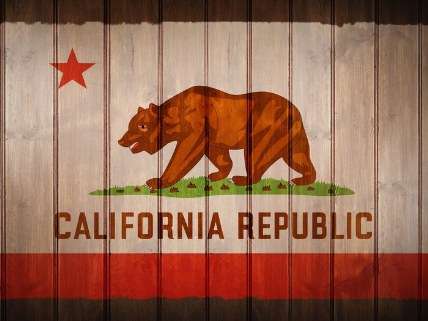CalExit Secession Movement Dies the Way It Lived: Stupidly
Organizer decides he wants to continue to live in Russia.

One notably bizarre, disorganized push to turn California into its own country is dead—at least for now. Its leader, Louis J. Marinelli, announced that he is canceling the petition and pulling up stakes. While he said he believed in the struggle for California's independence "from the United States so we could build the kind of country that reflects our progressive values," he has decided on a new path.
He's decided he'd rather live in Russia, which is not exactly famous for its progressiveness.
In a missive released yesterday afternoon he said that life in Russia would offer him "a future detached from the partisan divisions and animosity that has thus far engulfed [his] entire life." Yes, one imagines it is true that he's going to face much less partisan divisiveness in Russia given how frequently very bad things happen to those who oppose the status quo there.
The CalExit push—a ballot initiative that would have given California residents the opportunity to vote on whether the country should secede from the union—was an obscure effort that suddenly became a high-profile movement due to dissatisfaction from coastal and tech community progressives with President Donald Trump's election as president.
Almost immediately after CalExit began getting real press coverage did the fact that organizer Marinelli was actually living in Russia, not America, also start getting attention. That news raised the specter that this was all another potential attempt to sow chaos by Russian government operatives. Another leader (who also resigned this week) told the Sacramento Bee that possible donors started backing out once Marinelli's background came to light, fearing that the secession movement would be tied to Vladimir Putin.
Despite the increased profile from the secession movement, the Sacramento Bee also notes that it didn't seem to actually translate into practical organizing skills. They still had not raised any money and it wasn't even clear whether they were even collecting signatures. They need more than half a million to actually make it to the ballot.
While secession efforts are generally supportable methods for citizens to control their own political destinies, I've been a massive critic of CalExit due to the utter obliviousness of supporters like Marinelli about the state's make-up and financial state. CalExit supporters seemed to be unaware that there was more to the state than the progressive and wealthy coastal communities and that large swathes of inland California were full Trump voters who had been historically attempting to break off into their own states to get away from the big cities and Sacramento's rulership. Furthermore CalExit's proponents had convinced themselves that California's struggles were due to the federal government taking their money and not due to the state's own spending choices, massive debts, and unsustainable pension commitments with state and local government employees.
Over at the National Review, Kevin D. Williamson delved into the general incoherence of this particular secession drive in a cover story (hitting the stands right as the whole thing collapsed) and interviewed Marinelli, who like many coastal Californians, didn't seem to be quite aware of the rest of the state's populace.
Williamson also took note of other efforts to break up California, like conservative or libertarian citizens deeper within the state to the north who want to get away from their domineering southern and coastal citified brothers and sisters and create the state of Jefferson. Why shouldn't they? The state's power has become more and more entrenched with urban and government body interests, and those who don't live in those areas continue to struggle for any sort of representation at all.
Recall the state's decision to dramatically increase the minimum wage. It's not as big a nightmare in urban environments where wages and the costs of living are already generally higher (though to be clear—it is going to make it harder for some people to enter the workforce, even in cities). It's in rural parts of the state where people simply cannot afford to pay higher costs for goods in order to fund the wage increases where it's going to hurt. And there's absolutely no interest state leaders care. Indeed, Gov. Jerry Brown famously indicated that he knew a statewide minimum wage increase was bad economics but approved it anyway for political interests.
Steven Greenhut wrote just last week that efforts to break up California probably aren't going to be going away anytime soon. And one of the leaders of CalExit told the Sacramento Bee he was going to join yet another movement for California to secede and hopes to launch a new ballot initiative.


Show Comments (95)